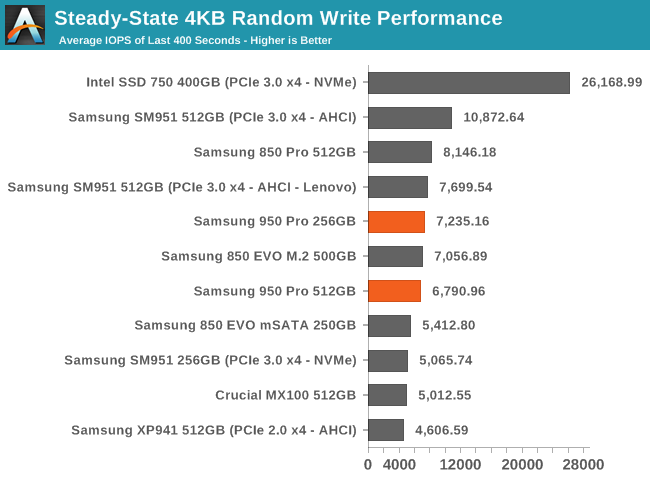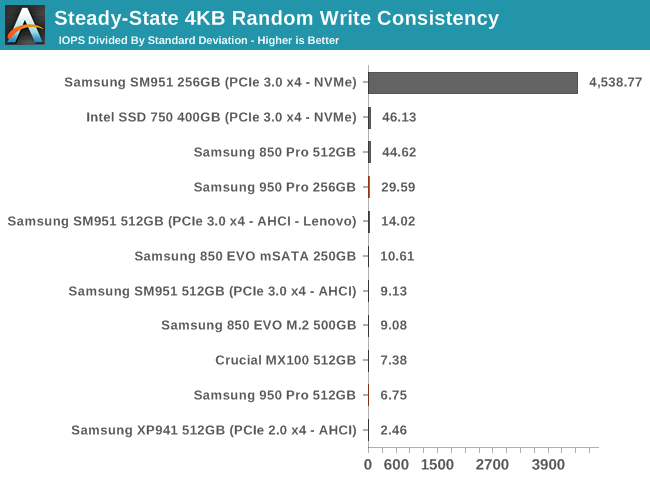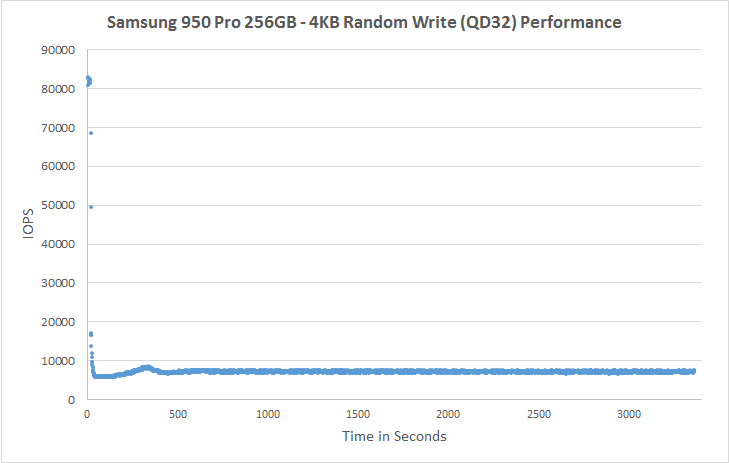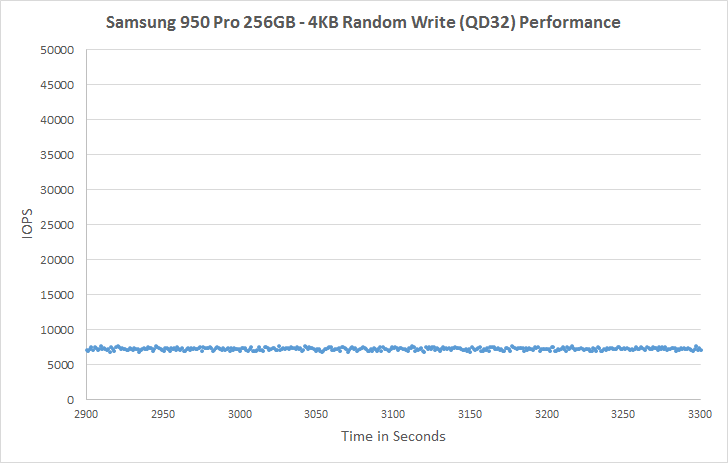The Samsung 950 Pro PCIe SSD Review (256GB and 512GB)
by Billy Tallis on October 22, 2015 10:55 AM ESTPerformance Consistency
Kicking things off, our performance consistency test saturates the drive with 4kB random writes for a full hour, with a queue depth of 32, the maximum supported by the AHCI protocol used by SATA and most PCIe drives. This puts the drive's controller under maximum stress and writes enough data to exhaust all free space and spare area on the drive. This is an unrealistic workload for any client use, but it provides a worst-case scenario for long-term heavy use, and it sheds light on how different SSD controllers behave and if their performance will hold up as they fill up.
The average of the last 400 seconds of the test gives us a steady-state IOPS rating that is usually very different from what the manufacturer specifies for a new, empty drive. We also quantify the consistency of the drive's random write performance, and provide plots of the performance over the course of the test.

Once steady state is reached, performance is determined more by the controller's algorithms than the interface speed, so it's not too surprising to see the 950 Pro performing similarly to other Samsung drives.

The consistency metric shows a surprising disparity between the two 950 Pros, with the 256GB performing much better.
 |
|||||||||
| Default | |||||||||
| 25% Over-Provisioning | |||||||||
Comparing the graphs of the two 950s shows that the inconsistency of the 512GB drive comes from frequent jumps in performance above a solid baseline. This pattern holds even for the test with overprovisioning. Graphing the power consumption over time (not shown) reveals that the periods of lower performance have lower power. If the lower performance were due to periodic background garbage collection, then we would expect power consumption to be at least as high as when the drive is performing well. Instead, it appears that the 512GB drive is experiencing thermal throttling.
 |
|||||||||
| Default | |||||||||
| 25% Over-Provisioning | |||||||||
With most of its time spent thermally limited, our 512GB sample's low average is explained. It appears that the thermal throttling mechanism is bumping the drive down to one of several discrete performance levels, rather than a continuous performance mechanism.










142 Comments
View All Comments
herbc - Friday, October 23, 2015 - link
How fast do you really need to be happy with using a computer is my question , my computer is faster now than i actually need it to be and all it has is a current SSD .Woff - Friday, October 23, 2015 - link
I have a system with Asus X99 DeLuxe motherboard and a I7-5960X cpu. I use a Samsung 850 EVO 500GB SSD connected to one of the SATA ports, but I want to upgrade this device to a M.2 Samsung 950 Pro. The motherboard offers two ways to connect a M.2 but I don't know witch is the best alternative. The X99 has a on-board M.2 (socket3) but is also delivered with a expansion card, a 'HYPER M.2 x4' card. Anyone who can help me with the best (fastest) solution to my problem?Redstorm - Friday, October 23, 2015 - link
You should be OK to use the Onboard M.2 slot as the manual says "32Gb transfer for the onboard M.2" page 'x' so 4 x PCIe 3.0cjelliott - Tuesday, November 17, 2015 - link
How did you get on with this 950 Pro SSD on the X99 Deluxe? Can you boot from it? I am tempted to buy this SSD but have seen a lot of forums where people are having trouble. I want to install and boot Win 10 Pro from it.l_d_allan - Saturday, October 24, 2015 - link
Hmmmm ... the Samsung Galaxy review was at the top for 5 days, then one day for an ASUS mother board, and only one day for the Surface 4, and now several days for the Samsung PCie SSD.Seems unbalanced. Or just "the luck of the draw"?
Kristian Vättö - Sunday, October 25, 2015 - link
Usually content is only released on weekdays, so reviews that go up later in the week (e.g. on Thursday) may get several days of page time. Oftentimes the content release is dictated by an embargo lift, so the time of publishing isn't on AnandTech's hands.I can assure you that this is just a coincidence - there's no rule or contract that a certain company must get X number of days at the top. Frankly, it wasn't even something we thought about during my time at AnandTech as content always went up when it was ready and free for publishing.
Craig234 - Saturday, October 24, 2015 - link
"The Intel SSD 750 clearly needs to come down in price to be completely sidelined by the 950 Pro. "I think you mean to AVOID being completely...
TheBeagle - Saturday, October 24, 2015 - link
I case anybody is interested, Amazon.com has this lovely items for sale (pre-order) right now. The Amazon web site says the product will be released for sale on Thursday, October 29th. Hurry up before they're all gone - LOL! BeagleFXi - Saturday, October 24, 2015 - link
I know it's not a lot of space but some degree of power loss protection would have been proper for a "pro" device in this price category.Kristian Vättö - Sunday, October 25, 2015 - link
The 950 PRO, just like all Samsung client SSDs, do journaling to protect the FTL against sudden power losses. Protection for cached user data is not really needed since modern file systems have been designed to withstand minor data losses (HDDs also use DRAM to cache writes, so SSDs are no different in that sense).